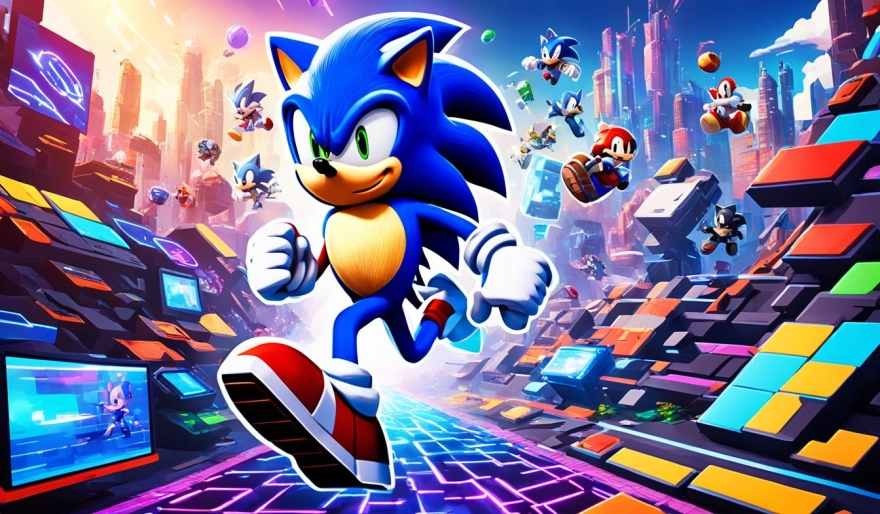The Rise and Fall of Sega: A Legendary Gaming Journey
33 min read The Rise and Fall of Sega: A Legendary Gaming Journey -written by Amine Rukhi, Content Creator August 01, 2024 10:01
The Rise and Fall of Sega: A Legendary Gaming Journey
Sega's story is a thrilling mix of ups and downs in the video game world. It started as a small arcade cabinet maker and quickly became a big name. This story will look at Sega's best moments and tough times. We'll see what made it famous and what led to its decline.
Key Takeaways
- Sega's transformation from a humble arcade company to an industry-defining console maker
- The fierce console wars between Sega's Genesis and Nintendo's Super Nintendo
- The innovative features and groundbreaking technology of Sega's Dreamcast console
- Sega's lasting impact on gaming culture and the rise of retro gaming
- Lessons learned from Sega's successes and failures in the video game industry
Sega's Early Days: From Humble Beginnings to Industry Disruptor
Sega, the famous video game company, started small but grew big. It was founded in 1940 as the Standard Games Manufacturing Company. They made arcade games and slot machines first. By the 1960s, Sega entered the home console market with the Sega SG-1000.
Sega's Founding and First Ventures
In 1940, Sega started in Hawaii as the Standard Games Manufacturing Company. They made arcade games and slot machines. By the 1950s, they moved to Tokyo, Japan, and changed their name to Nihon Goraku Bussan, or "Japan Amusement Supplies."
During the 1960s and 1970s, Sega grew its Sega arcade games business. They became a big name in Japan's arcade scene. This success helped them move into the home console market.
The Birth of the SG-1000: Sega's First Home Console
In 1983, Sega launched the Sega SG-1000, its first Sega home console. It was made to meet the growing need for home video games. The SG-1000 didn't top its rivals in sales, but it was a big step for Sega.
| Year | Event |
|---|---|
| 1940 | Sega is founded as the Standard Games Manufacturing Company in Hawaii |
| 1960s | Sega expands its arcade games business in Japan, becoming a dominant force in the market |
| 1983 | Sega introduces the SG-1000, its first home console |
Sega's early days set the stage for its success. Starting with arcade games and slot machines, Sega became a giant in the video game world. They left a lasting impact on interactive entertainment.
The Meteoric Rise of the Sega Genesis
The Sega Genesis changed the game for gamers everywhere. It played a big part in Sega's rise to fame. This console challenged Nintendo and started a new era of competition, known as the "console wars".
The Genesis vs. Super Nintendo Rivalry
The fight between the Sega Genesis and the Super Nintendo was epic. Both consoles had great graphics and new gameplay. Sega's Genesis won fans with its fast speed and Sonic the Hedgehog. Nintendo's Super Nintendo was more family-friendly.
This rivalry made gamers excited. They loved debating which console was better. This debate fueled the "console wars" that changed gaming for years.
Sega's Marketing Genius: The Attitude Era
Sega's marketing made the Genesis a hit. They used a bold "attitude" in their ads, unlike Nintendo's family-friendly style. Their "Genesis does what Nintendon't" slogan and cool ads drew in gamers who wanted to be different.
Iconic Games that Defined the Genesis Era
The Sega Genesis had amazing games that made it stand out. Games like Sonic the Hedgehog, Streets of Rage, Gunstar Heroes, and Phantasy Star became classics. These games showed Sega's commitment to great gaming.
| Top Selling Genesis Games | Release Year |
|---|---|
| Sonic the Hedgehog | 1991 |
| Madden NFL '94 | 1993 |
| Streets of Rage 2 | 1992 |
| Contra: Hard Corps | 1994 |
| Phantasy Star IV | 1993 |
The Sega Genesis's rise and the "console wars" it started changed gaming forever. It made Sega a major player in the industry. It left a lasting impact on gamers everywhere.
The Sega Saturn: A Promising Console Plagued by Missteps
The Sega Saturn came out in 1994 and was seen as a big chance to beat Sony's PlayStation and Nintendo's Nintendo 64. But, it faced big problems because of bad strategies and marketing mistakes. These issues led to its failure.
Sega couldn't keep up with the PlayStation and Nintendo 64. The Saturn had great specs, but its marketing and launch plan got a lot of criticism. People found it confusing and not well-timed.
Also, Sega surprised everyone by announcing the Saturn at the 1995 E3 conference. This caught game makers and store owners off guard. It made it hard for the Saturn to get the support it needed from game developers.
The Saturn didn't have enough big, must-have games. It had some great ones like Nights into Dreams and Panzer Dragoon, but not enough to compete with others.
In the end, the Sega Saturn failed because of Sega's mistakes, bad marketing, and not being able to beat the PlayStation and Nintendo 64. Its great potential was lost because of these issues.
"The Sega Saturn was a console that held great promise, but it was ultimately undone by a series of strategic and marketing missteps that proved too much to overcome."
The Rise and Fall of Sega: A Legendary Gaming Journey
Sega's journey in the video game world is truly amazing. It started as a new force, challenging Nintendo and winning over gamers worldwide. But, as games changed fast, Sega's decline was inevitable, changing the game landscape.
Many things led to Sega's fall. It couldn't adjust to new markets, faced tough competitors, and made some wrong moves. As consoles got more powerful and easier to use, Sega couldn't keep up, losing to its competitors.
Sega changed from making consoles to making games for others. This move showed its strength and ability to change. It used its famous games to stay relevant in the fast-changing game world. This let Sega focus on making games that people love.
Sega's story warns us about the need for smart planning and adapting to change. But, its lasting impact and famous games like Sonic the Hedgehog keep its legacy alive. Sega's influence on games will be felt for many years to come.
"Sega's decline was a testament to the need for constant innovation and the ability to adapt to the ever-changing landscape of the video game industry."
| Year | Key Event | Impact on Sega |
|---|---|---|
| 1998 | The release of the Sony PlayStation | Sega's Saturn console struggled to compete with the more popular PlayStation, leading to declining market share and financial losses. |
| 2001 | Sega discontinues the Dreamcast console | Sega's hardware business was shuttered, marking the end of its efforts to compete in the console market. |
| 2001-2003 | Sega transitions to a third-party game developer | Sega shifted its focus to creating games for other platforms, leveraging its rich intellectual property and game development expertise. |
The Dreamcast: Sega's Innovative But Ill-Fated Console
In the late 1990s, Sega aimed to get back into the console game with the Dreamcast. This Sega Dreamcast was a leap forward, packed with features that were way ahead of its time. It promised to change how we play games.
Ahead of Its Time: The Dreamcast's Groundbreaking Features
The Sega Dreamcast was the first to have internet built right in. This meant gamers could play online, surf the web, and even check email. It had a huge selection of games, from classic Sega hits to new 3D adventures. The console also came with cool controllers, like the VMU, which added a second screen for better gameplay.
Even with all its cool tech and features, the Sega Dreamcast had a tough time. It couldn't beat the PlayStation 2 and Xbox in sales, leading Sega to leave the Sega hardware business.
The Decline of Sega's Hardware Business
The Dreamcast's failure meant the end of Sega's console days. The company couldn't match its rivals in marketing or money, and the Dreamcast didn't sell well. So, Sega decided to focus on making games and licensing its famous characters to others.
This move marked a big change for Sega. It moved from making consoles to being a game developer. Now, it focuses on its beloved games for a broader audience.
Sega's Transition to a Third-Party Developer
Sega's journey changed when it decided to move from making its own games to becoming a third-party developer. This big change started a new chapter for the famous brand. It used its deep knowledge in game making and popular games to fit into the changing video game world.
Switching to a third-party developer was tough, but Sega's drive for new ideas helped it succeed. The company's well-loved Sonic the Hedgehog and other franchises were key to its success in this new role.
Sega's skill in making games, built over years, let it create fun and engaging games for many platforms. Working with different console makers helped Sega's games reach more players. This made Sega a top third-party developer in the industry.
| Sega Franchises | Platforms Developed For |
|---|---|
| Sonic the Hedgehog | Nintendo, Sony, Microsoft, PC |
| Yakuza | PlayStation, PC |
| Total War | PC |
| Persona | PlayStation, Nintendo |
Being a third-party developer helped Sega earn more money and stay strong in the gaming world, even when its hardware business struggled. By focusing on making games and using its famous franchises, Sega has kept up with the changing market. This has made Sega a true pioneer in gaming.
"Sega's transition to a third-party developer allowed us to focus on what we do best: creating engaging and innovative gaming experiences that captivate players worldwide."
The Enduring Legacy of Sega's Iconic Franchises
Sega has made a big impact in the gaming world. They created some of the most loved franchises in video game history. At the heart of this is Sonic the Hedgehog, a character that has won the hearts of players for years.
Sonic the Hedgehog: Sega's Beloved Mascot
Sonic the Hedgehog was introduced in 1991 and quickly became Sega's top character. He is known for his speed, cool personality, and exciting games. Sonic has become a cultural icon, loved by gamers of all ages.
From the early days to now, the Sonic series has kept evolving. It brings in new fans with its classic gameplay and memorable characters.
Other Classic Sega Franchises that Stood the Test of Time
While Sonic is Sega's most famous franchise, they have many other beloved series. The Shenmue saga offers fast-paced action, and the Total War franchise is known for its strategy. These games have made a lasting impact on the gaming world.
Other Sega franchises that are still popular include:
- Phantasy Star, a pioneering sci-fi RPG series
- Yakuza, a gritty open-world action-adventure series
- Football Manager, a top sports management simulation
- Jet Set Radio, a groundbreaking skateboarding game
These Sega games continue to attract players. They show Sega's skill in making games that connect with fans across different generations.
Sega's franchises have not just entertained gamers but have also changed the industry. They've inspired new creativity and innovation. As Sega moves forward, the legacy of these iconic franchises shows their lasting impact on gaming.
The Impact of Sega's Innovations on the Gaming Industry
Sega has made a huge impact on the gaming world. Its tech advances and new game designs have changed how we enjoy games. Sega's work has deeply influenced the industry.
The Sega Genesis showed off the company's tech skills. It was a console that set new standards for home gaming. With its 16-bit power, it offered amazing visuals and smooth play, making it a big hit.
Sega didn't just focus on hardware. Its game design was also a big deal. Games like Sonic the Hedgehog created memorable characters and fun gameplay. This style of play has inspired many other games.
Sega's marketing was also groundbreaking. The "Attitude Era" of the Genesis brought bold, edgy ads to the table. This approach drew in young gamers, making Sega a brand that knew what players wanted.
"Sega's innovations didn't just shape the gaming industry – they defined it. From their technological breakthroughs to their visionary game design, the company's impact can still be felt today."
Even when Sega's hardware business slowed down, its influence stayed strong. Games like Sonic the Hedgehog and Virtua Fighter still excite players and inspire game makers. Sega's drive for innovation has changed gaming forever.
Sega's Influence on Modern Gaming Culture
Sega's legacy goes far beyond its early innovations and famous games. It has deeply influenced modern gaming culture. This has led to a strong nostalgia and appreciation among players all over the world. As retro gaming grows, Sega's work is more and more celebrated.
Sega's Contributions to the Retro Gaming Movement
Games like the Genesis/Mega Drive and characters like Sonic the Hedgehog are key to retro gaming. Fans have kept Sega's gaming history alive, sparking a new interest in its classic titles. This has led to retro-style hardware and remastered collections, making Sega's impact felt in today's gaming world.
Sega's games and characters are still very popular, creating a strong community of fans. These fans, including modders and content creators, keep Sega's classics alive. Their work, from mods to YouTube channels, helps keep Sega's cultural impact strong today.
FAQ
What was Sega's founding and early history?
Sega started as a small arcade game company. It then made its first home console, the SG-1000. This was the start of its journey to success and challenges.
How did the Sega Genesis rise to prominence and challenge Nintendo?
The Sega Genesis made Sega a big name by challenging Nintendo. It used new marketing and released iconic games. This created a big rivalry with the Super Nintendo.
What challenges did the Sega Saturn face, and how did it contribute to the company's decline?
The Sega Saturn had big hopes but faced many problems. It struggled against the PlayStation and Nintendo 64. These issues led to Sega's decline in making consoles.
What made the Sega Dreamcast innovative, and how did its failure lead to Sega's transition to a third-party developer?
The Dreamcast was ahead of its time with online play and a wide game selection. But it failed, causing Sega to stop making consoles. This led them to become a third-party developer.
How have Sega's iconic franchises, such as Sonic the Hedgehog, stood the test of time?
Sega's famous games, like Sonic the Hedgehog, still excite players today. They show how Sega's creativity and innovation have made a lasting impact.
What was Sega's influence on the broader gaming industry, and how has it impac
User Comments (0)
Popular Apps










Editor's Choice









